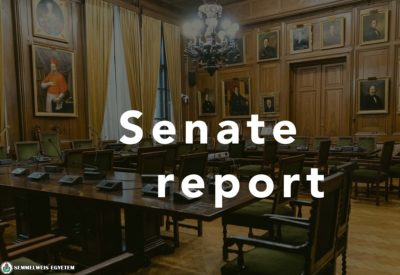Dr. Lívia Pavlik, Chancellor of the University, reported on the financial results of the first half of the year (H1). State funding for health and education activities for H1 2024 amounted to HUF 116 billion compared to the revenue plan of HUF 107 billion. The 108 percent (approximately HUF 9 billion) budget outturn is mainly due to the targeted funds by the National Health Insurance Fund of Hungary (NEAK) related to the Clinical Center (cover for the salary increase of the professional staff, benefits granted on grounds of equity) exceeding the planned amount by approximately HUF 8.4 billion, which is accompanied by an equal amount of costs on the expenditure side. The NEAK revenues based on performance turned out to be approximately HUF 0.9 billion higher than forecast. State education subsidies remained broadly in the planned range. In terms of market revenue, the largest source of income is foreign currency tuition fees, where the actual performance exceeded the HUF 10 billion plan for H1 by HUF 244 million due to changes in the number of students and the exchange rate. Fee-based patient care, pharmacy sales, and clinical research performed as planned. In terms of expenses, costs paid for services were lower than planned, and these cost savings are the main source of the higher-than-planned result in the first semester.
The operating result turned out to be HUF 7 billion, compared to the planned HUF 1.4 billion within a revenue plan of approximately HUF 250 billion. The financial result is positive, with revenue of HUF 0.9 billion broadly in line with the budget. The plan estimated HUF 2.3 billion in pre-tax profit in H1, while the actual performance was HUF 7.88 billion, the chancellor’s briefing revealed. All revenue lines performed better than planned, and the expenses were kept below the planned amount, thanks to the use of force majeure funds which were only partially used in H1.
The senators decided to amend the Study and Examination Regulations (TVSZ). At the Faculty of Medicine (ÁOK), the Faculty of Dentistry (FOK), and the Faculty of Pharmaceutical Sciences (GYTK), the possible absence rate was reduced from 25 to 10 percent to enhance the practice-oriented approach of the courses.
The board also voted on several changes of personnel: Dr. Veronika Müller, Deputy Dean of the Faculty of Medicine and Director of the Department of Pulmonology and the Outer Clinical Block, will be replaced by Dr. Pál Maurovich Horvat in the Scientific Council; and as of September 1, Deputy President Dr. Péter Vámosi will replace Dr. Boldizsár Kiss as delegate of the Doctoral Students’ Union in the Habilitation Committee. The board supported the appointment of Dr. Andrea Fekete as chairman of the Károly Rácz Conservative Medicine Division of the Doctoral College following the expiry of Dr. György Reusz’s term of office.
Senators voted in favor of launching a master’s degree in Pharmaceutical Innovation and Business Administration (Pharma MBA). The master’s program aims to train professionals who are familiar with the entire value chain of the development and distribution of healthcare industry products (e.g. pharmaceuticals, medical technology, food for special medical purposes, dietary supplements, etc.), and who are able to manage each stage of the process, with the involvement of professionals with specific expertise. The future professionals will be able to manage the complex and specific process of market utilization of innovations in the health sector, in compliance with the specific regulations of licensing, public funding, manufacturing, and distribution processes, as well as marketing activities. Candidates can apply for the four-semester program with a master’s degree. If the master’s degree is in a field other than life sciences, proof of at least 3 years of experience in the health industry is also required. The target group of the training are the inventors and alumni of Semmelweis University, industry players carrying out collaborative research with the university, and universities cooperating with Semmelweis University in the context of tenders and agreements.
The Senate also approved a nomination for the László Batthyány-Strattmann Award, a ministerial-level distinction. Under Any Other Business, the senators were presented with a proposal on the salary increase for theoretical teachers and the plan to relocate the freshman camp to Zánka.
Anita Szepesi
Translation: Judit Szabados-Dőtsch
Photo by Attila Kovács – Semmelweis University


